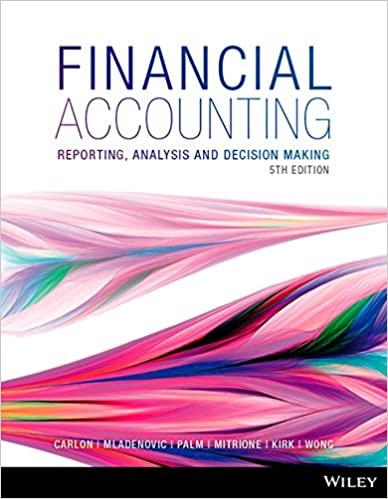Question
Static Budget versus Flexible Budget The production supervisor of the Machining Department for Hagerstown Company agreed to the following monthly static budget for the upcoming
Static Budget versus Flexible Budget
The production supervisor of the Machining Department for Hagerstown Company agreed to the following monthly static budget for the upcoming year:
| Hagerstown Company Machining Department Monthly Production Budget | |
| Wages | $549,000 |
| Utilities | 40,000 |
| Depreciation | 66,000 |
| Total | $655,000 |
The actual amount spent and the actual units produced in the first three months in the Machining Department were as follows:
| Amount Spent | Units Produced | |||
| May | $619,000 | 112,000 | ||
| June | 592,000 | 102,000 | ||
| July | 566,000 | 92,000 | ||
The Machining Department supervisor has been very pleased with this performance because actual expenditures for MayJuly have been significantly less than the monthly static budget of 655,000. However, the plant manager believes that the budget should not remain fixed for every month but should flex or adjust to the volume of work that is produced in the Machining Department. Additional budget information for the Machining Department is as follows:
| Wages per hour | $18.00 |
| Utility cost per direct labor hour | $1.30 |
| Direct labor hours per unit | 0.25 |
| Planned monthly unit production | 122,000 |
a. Prepare a flexible budget for the actual units produced for May, June, and July in the Machining Department. Assume depreciation is a fixed cost. If required, use per unit amounts carried out to two decimal places.
| Hagerstown Company | |||
| Machining Department Budget | |||
| For the Three Months Ending July 31 | |||
| May | June | July | |
| Units of production | 112,000 | 102,000 | 92,000 |
| $fill in the blank | $fill in the blank | $fill in the blank | |
| fill in the blank | fill in the blank | fill in the blank | |
| fill in the blank | fill in the blank | fill in the blank | |
| Total | $fill in the blank | $fill in the blank | $fill in the blank |
| Supporting calculations: | |||
| Units of production | 112,000 | 102,000 | 92,000 |
| Hours per unit | x fill in the blank | x fill in the blank | x fill in the blank |
| Total hours of production | fill in the blank | fill in the blank | fill in the blank |
| Wages per hour | x $fill in the blank | x $fill in the blank | x $fill in the blank |
| Total wages | $fill in the blank | $fill in the blank | $fill in the blank |
| Total hours of production | fill in the blank | fill in the blank | fill in the blank |
| Utility costs per hour | x $fill in the blank | x $fill in the blank | x $fill in the blank |
| Total utilities | $fill in the blank | $fill in the blank | $fill in the blank |
b. Compare the flexible budget with the actual expenditures for the first three months.
| May | June | July | |
| Total flexible budget | $fill in the blank c | $fill in the blank | $fill in the blank |
| Actual cost | fill in the blank | fill in the blank | fill in the blank |
| Excess of actual cost over budget | $fill in the blank | $fill in the blank | $fill in the blank |
What does this comparison suggest?
| The Machining Department has performed better than originally thought. | |
| The department is spending more than would be expected. |
Step by Step Solution
There are 3 Steps involved in it
Step: 1

Get Instant Access to Expert-Tailored Solutions
See step-by-step solutions with expert insights and AI powered tools for academic success
Step: 2

Step: 3

Ace Your Homework with AI
Get the answers you need in no time with our AI-driven, step-by-step assistance
Get Started


